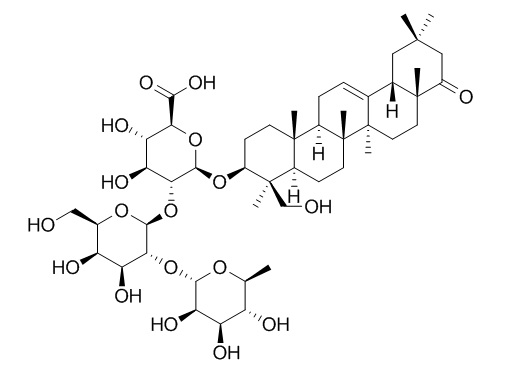Soyasaponin Be
1. Soyasaponins has chemoprevention activities, it prevent H₂O₂-induced inhibition of gap junctional intercellular communication by scavenging reactive oxygen species in rat liver cells.
2. Soyasaponins can significantly decrease blood glucose, improve atherosclerotic index, and inhibit lipid peroxidation and platelet aggregation in diabetic rats, which may be useful in prevention and control of diabetes mellitus and diabetes-associated atherosclerosis.
3. Soyasaponins abundant in soybean have anti-inflammatory activities, low-dose SSs alleviated contact hypersensitivity (CHS) symptoms by attenuating inflammation and improving the intestinal microbiota composition, suggesting that dietary SSs may have beneficial effects on allergic contact dermatitis (ACD).
4. Dietary soyasaponin has inhibitory effects on 2,4-dinitrofluorobenzene-induced contact hypersensitivity in mice.
Inquire / Order:
manager@chemfaces.com
Technical Inquiries:
service@chemfaces.com
Tel:
+86-27-84237783
Fax:
+86-27-84254680
Address:
1 Building, No. 83, CheCheng Rd., Wuhan Economic and Technological Development Zone, Wuhan, Hubei 430056, PRC
Providing storage is as stated on the product vial and the vial is kept tightly sealed, the product can be stored for up to
24 months(2-8C).
Wherever possible, you should prepare and use solutions on the same day. However, if you need to make up stock solutions in advance, we recommend that you store the solution as aliquots in tightly sealed vials at -20C. Generally, these will be useable for up to two weeks. Before use, and prior to opening the vial we recommend that you allow your product to equilibrate to room temperature for at least 1 hour.
Need more advice on solubility, usage and handling? Please email to: service@chemfaces.com
The packaging of the product may have turned upside down during transportation, resulting in the natural compounds adhering to the neck or cap of the vial. take the vial out of its packaging and gently shake to let the compounds fall to the bottom of the vial. for liquid products, centrifuge at 200-500 RPM to gather the liquid at the bottom of the vial. try to avoid loss or contamination during handling.
Front Pharmacol.2022, 13:883475.
JLiquid Chromatography & Related Tech.2021, 10826076.
Acta Pharm Sin B.2024, 14(4):1772-1786.
Chemistry of Natural Compounds2018, 54(3):572-576
Front Pharmacol.2023, 14:1244655.
Anticancer Res.2024, 44(3):1033-1044.
Food Chem.2019, 278:683-691
The Journal of Internal Korean Medicine2015, 36(4):486-497
Microchemical Journal2024: 196:109676.
Food Chem Toxicol.2024, 186:114589.
Related and Featured Products
Phytomedicine, 2014, 21(8-9):1062-1069.
Antinociceptive activity of the HPLC- and MS-standardized hydroethanolic extract of Pterodon emarginatus Vogel leaves.[Reference:
WebLink]
Several studies have demonstrated the analgesic and anti-inflammatory effects of fruit and seed extracts from Pterodon emarginatus Vogel (Fabaceae).
METHODS AND RESULTS:
The objective of this study was to evaluate the antinociceptive activity of the hydroethanolic extract of P. emarginatus leaves in mice and characterize its chemical composition using HPLC coupled to UV–vis diode array detection and mass spectrometry with electrospray ionization. Our results showed that the doses of 500 and 1000 mg/kg produced an antinociceptive effect, as observed in the hot plate test and writhing induced by acetic acid. The chromatographic profile and spectral mass data suggest the presence of di-C-glycosylflavones (e.g., vicenin-2 and schaftoside), C,O-glycosylflavones (e.g., chrysoeriol-8-C-glucosyl-2″-O-glucuronide-6-C-arabinoside) and luteolin-7-O-rutinoside as the main constituents. Lower levels of oleanane-type saponins, such as soyasaponin Bb and Soyasaponin Be, and the saponin derivatives hederagenin and aglycone B, which are typical of Fabaceae family, were also found.
CONCLUSIONS:
From this study, it is suggested that the analgesic effect observed is not due to the terpenoids previously reported from fruit and seed extracts, but could be attributed to flavones and the hederagenin derivatives that were identified as main constituents of the hydroethanolic extract from the leaves.



